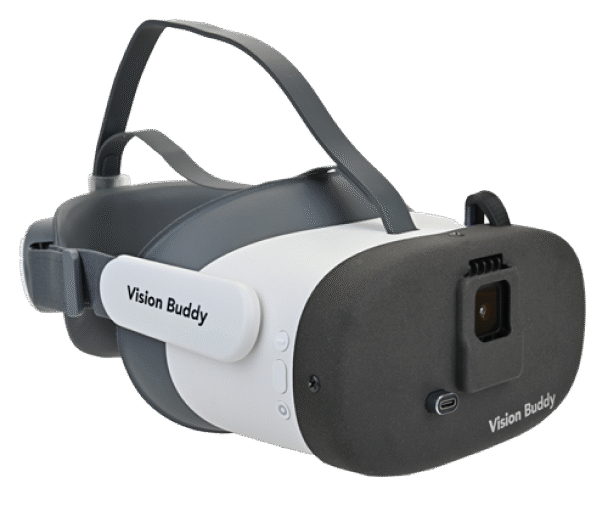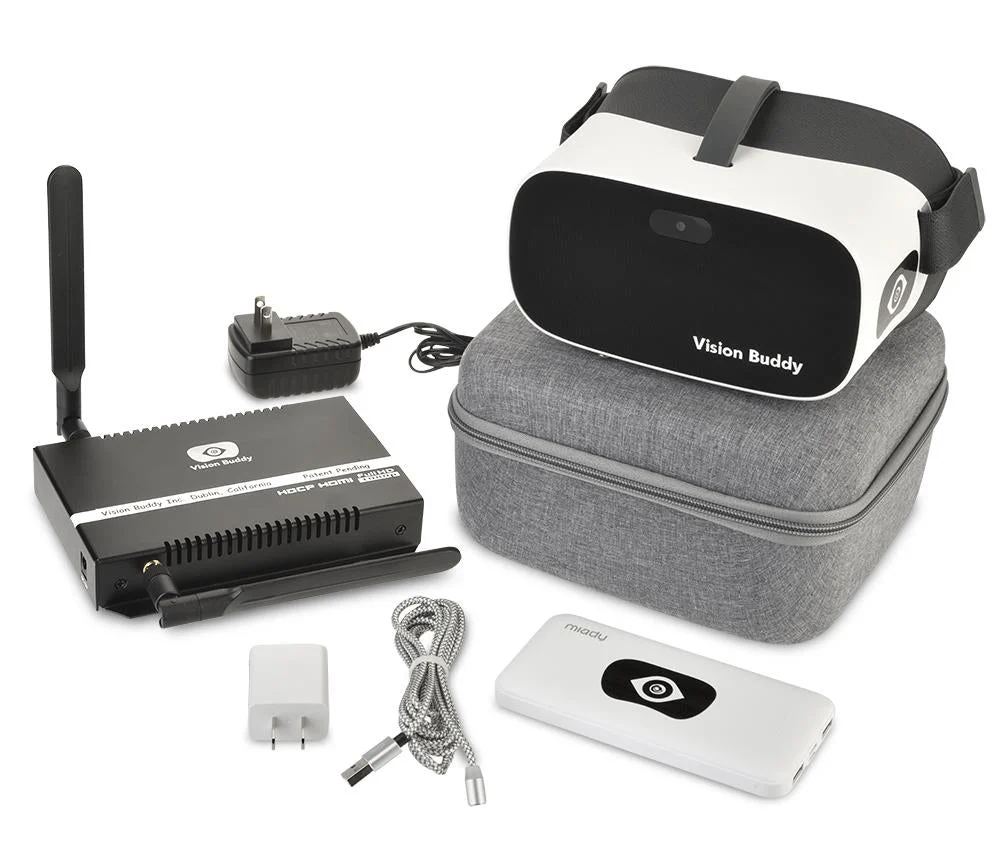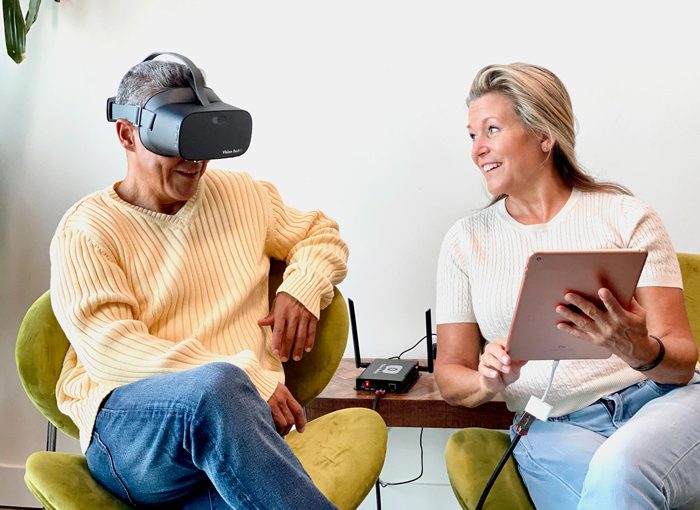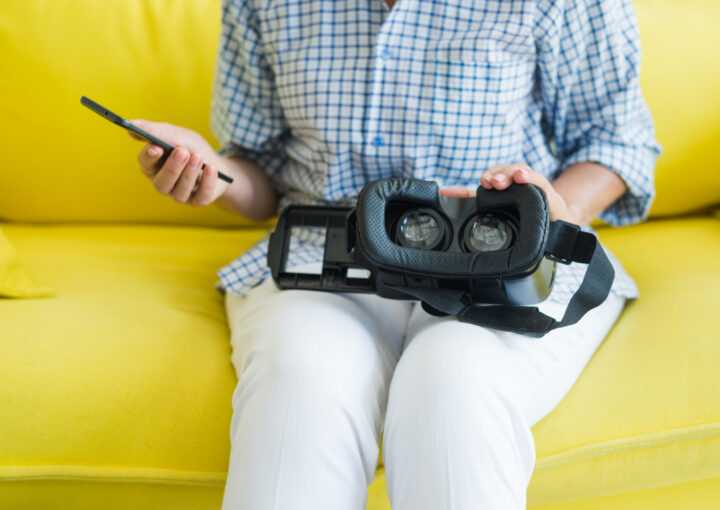


Maya Williams
Table of Contents
- Summary
- Understanding Low Vision and Its Impact
- Common Diseases That Cause Low Vision
- What Are Low Vision Aids?
- Vision Buddy: A Revolutionary Assistive Technology
- Key Features That Set Vision Buddy Apart
- Real-Life Stories: Regaining Independence With Vision Buddy
- How Vision Buddy Compares to Other Low Vision Glasses
- Who Should Use Vision Buddy?
- Final Thoughts: A New Vision for 2025
Summary
Living with low vision isn’t just about struggling to read a book or missing a scene on TV, it’s about losing pieces of your independence.
Millions of people face the daily challenges that come with impaired vision, often due to conditions like macular degeneration or glaucoma. While traditional low vision aids offer some support, many fall short in providing true independence, modern technology is providing new hope.
Among the most talked-about solutions in 2025 is Vision Buddy, an innovative tool in the world of low vision aids. With its advanced assistive technology, Vision Buddy brings clarity, confidence, and connection back to people living with macular degeneration, glaucoma, diabetic retinopathy, and other diseases that cause low vision.
This emotionally resonant blog explores how Vision Buddy is changing lives through cutting-edge assistive technology, giving users the power to reclaim control, independence, and joy.
Understanding Low Vision and Its Impact
Low vision is a condition that can’t be corrected by regular glasses, contact lenses, or even surgery. It’s not complete blindness but a significant visual impairment that makes everyday tasks challenging. Reading, recognizing faces, watching television, or navigating your environment can become frustrating, if not impossible.
For millions, low vision means struggling with:
- Reading books, newspapers, or medicine labels
- Watching TV or movies clearly
- Recognizing faces, leading to social isolation
- Navigating safely at home or in public
- Adapting to changing light conditions or glare
Low vision is especially common among older adults, but it can affect anyone. The result is difficulty with reading, mobility, recognizing faces, and maintaining independence.
Imagine not being able to see your grandchild’s face clearly or having to give up your favorite TV shows. That sense of loss can lead to isolation, anxiety, and a decline in quality of life. But thanks to advances in electronic glasses for low vision, there are now powerful solutions that can restore not only your vision but your confidence.
Common Diseases That Cause Low Vision
Low vision is often the result of chronic eye diseases, many of which progress over time. Understanding the root cause is key to finding the right assistive technology for your specific needs. Here are the most common diseases that cause low vision:
Macular Degeneration:
Affects central vision, making it hard to see details straight ahead.
Glaucoma:
Damages the optic nerve and can cause peripheral vision loss.
Diabetic Retinopathy:
A complication of diabetes that impacts blood vessels in the retina.
Retinitis Pigmentosa:
A genetic disorder that gradually narrows your field of vision.
Cataracts:
Clouding of the lens that leads to blurry or dim vision.
Each of these conditions can significantly affect quality of life. That’s why targeted solutions like low vision glasses are more essential than ever.
What Are Low Vision Aids?
Low vision aids are tools designed to help people with impaired vision live more independently. These can range from simple magnifiers to advanced electronic devices. Among the most effective in 2025 are wearable devices that act like digital glasses, offering magnification, contrast enhancement, and even text-to-speech features.
There are many types of aids, including:
- Portable low vision aids: Handheld magnifiers, electronic readers, and smart devices.
- CCTV low vision aids: Closed-circuit television systems that project magnified text or images on a screen.
- Low vision glasses: High-tech wearable glasses that enhance visual input.
While each of these has its merits, Vision Buddy brings together multiple benefits into one compact, easy-to-use solution.
Vision Buddy: A Revolutionary Assistive Technology
If you’re looking for a life-changing solution, Vision Buddy stands out as one of the most innovative electronic glasses for low vision in 2025. Developed specifically for people who want to watch TV, read, and navigate their surroundings independently, Vision Buddy offers a user-friendly experience without the steep learning curve of many other devices.
Unlike traditional magnifiers or handheld screens, Vision Buddy streams television content directly into the headset—eliminating background distractions and letting users focus on what they love most. It’s more than a tool—it’s a bridge back to normalcy.
How Vision Buddy Solves Real Problems
Effortless TV Watching
Traditional low vision aids struggle with TV screens, requiring users to sit uncomfortably close or rely on bulky CCTV systems. Vision Buddy changes the game by wirelessly streaming TV content in full HD directly to your glasses, allowing you to watch from anywhere in the room. No more squinting, straining, or missing out on family movie night.
Reading Made Easy
Reading small print—on books, newspapers, or medicine bottles—is one of the toughest challenges for those with low vision. Vision Buddy’s real-time magnification and automatic contrast adjustments make reading comfortable and efficient, regardless of print size or lighting conditions. The wearable design means your hands are free, and you can read for longer without fatigue.
Social Connection and Face Recognition
Low vision often leads to social anxiety, as recognizing faces becomes difficult. Vision Buddy’s smart camera and image enhancement features make it easier to see facial features and expressions, helping you stay connected and confident in social situations.
Navigating Daily Life
From cooking and grocery shopping to moving safely around the house, Vision Buddy’s object recognition and adjustable settings improve spatial awareness and mobility. Users report feeling more secure and independent, even in unfamiliar or changing environments
Key Features That Set Vision Buddy Apart
Vision Buddy isn’t just another entry in the world of low vision aids. It’s a full-fledged assistive technology solution with features that address multiple challenges:
- Live TV Streaming: Connects directly to your cable box or streaming device.
- HD Visuals: Sharp image quality optimized for low vision.
- Reading Mode: Enhances contrast and magnification for easier reading.
- Zoom and Magnification: Adjustable levels to fit individual needs.
- Lightweight Design: Comfortable enough for extended use.
- Simple Interface: Easy-to-use remote control and intuitive navigation.
These features make Vision Buddy more than just a portable low vision aid. It’s a complete visual enhancement ecosystem.
Who Benefits Most? Diseases That Cause Low Vision
Vision Buddy is designed for people with a wide range of diseases that cause low vision, including:
- Macular Degeneration: Enhances central vision and contrast, making it easier to read and watch TV.
- Glaucoma: Supports those with peripheral vision loss by magnifying and clarifying the central field of view.
- Diabetic Retinopathy: Helps compensate for patchy or blurred vision with real-time image processing.
- Cataracts and Other Conditions: Adjustable brightness and contrast help manage glare and low-light challenges.
No matter your diagnosis, Vision Buddy adapts to your unique vision needs, making it one of the most versatile electronic glasses for low vision on the market.
Real-Life Stories: Regaining Independence With Vision Buddy
One of the most compelling reasons to consider Vision Buddy is the impact it has on real lives. Take Marie, a 74-year-old retired teacher who was diagnosed with macular degeneration five years ago. Watching TV had become impossible, and reading was a struggle.
“I felt like I was disappearing,” she said. “But Vision Buddy changed everything. I watched my granddaughter’s school play live on TV and could actually see her face. I cried.”
Then there’s Jamal, a 58-year-old with glaucoma who still works part-time from home. “Vision Buddy lets me read emails and documents. It’s helped me keep my job and my independence.”
These stories aren’t rare. Thousands have regained autonomy through this powerful device.
How Vision Buddy Compares to Other Low Vision Glasses
When stacked against other low vision glasses, Vision Buddy consistently comes out on top. Here’s how it compares:
Feature | Vision Buddy | Other Low Vision Glasses |
Live TV Streaming | Yes | Rare or No |
Reading & Zoom Modes | Yes | Varies |
Ease of Use | High | Moderate to Complex |
Comfort | Lightweight & Soft | Bulky or Heavy |
Battery Life | Long-lasting | Shorter durations |
Price-to-Value Ratio | Excellent | Mixed |
If you’re seeking a dependable, all-in-one solution, Vision Buddy clearly leads the pack.
Who Should Use Vision Buddy?
Vision Buddy is ideal for:
- Seniors with macular degeneration or glaucoma
- Individuals affected by diseases that cause low vision
- Anyone looking for an easy way to enjoy TV, reading, or digital media
- People tired of bulky, complicated devices that don’t deliver results
Whether you live alone or have the support of a caregiver, Vision Buddy can dramatically enhance your day-to-day life.
Final Thoughts: A New Vision for 2025
Living with low vision doesn’t have to mean living without joy. With advances in assistive technology, especially solutions like Vision Buddy, you can reconnect with the world around you. From enjoying your favorite shows to reading a cherished book, Vision Buddy empowers you to live life on your terms.
In a market flooded with low vision aids, Vision Buddy rises above as the most comprehensive and user-friendly choice. Its features are built for real-world needs, and its technology is designed with compassion and clarity. If you’re looking for electronic glasses for low vision that actually work, Vision Buddy is more than a purchase—it’s an investment in your independence.
Explore how Vision Buddy can help you or your loved ones regain what matters most: the ability to see, connect, and thrive in 2025 and beyond.


